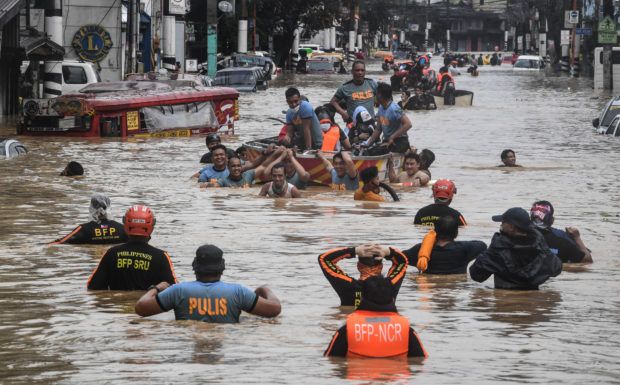Solon seeks 7-day emergency leave for workers affected by natural calamities, disasters

Rescuers pull a rubber boat carrying residents through a flooded street after Typhoon Vamco hit in Marikina City, suburban Manila on November 12, 2020. (Photo by Ted ALJIBE / AFP)
MANILA, Philippines — On top of the existing leave credits, a seven-day emergency leave for public and private employees affected by natural calamities and disasters is being sought in the House of Representatives.
Bulacan Rep. Jose Antonio Sy-Alvarado filed House Bill No. 8847, also known as the “Lingkod Calamity Leave Act.”
In filing this bill, Sy-Alvarado cited that the Philippines’ geographical location “makes it prone to numerous calamities and typhoons,” adding that an average of 20 typhoons hit the country annually.
Under the measure, “every employee who has rendered six months of service shall be entitled to a seven-day emergency leave each year, with pay, in times of natural calamities or disasters.”
FEATURED STORIES
The measure also reads that the seven-day special emergency leave shall be available upon the declaration of a state of calamity by the President of the Philippines or by the Local Sanggunian pursuant to Section 16 of Republic Act No. 10121 or the “Philippine Disaster Risk Reduction and Management Act of 2010.
“The special emergency leave can be applied for five straight working days or on staggered basis and will not be deducted from employee’s leave credits,” the House bill read. “This may be availed of by employees within 10 days from the date when the natural calamity or disaster occurred.”
Employees may avail of the special emergency leave on any of the following grounds:
- Being stranded in affected areas where there are no means of transportation that can ensure safe travel to and from work;
- Disease or illness of employee incurred by reason of the natural calamity or disaster;
- Caring of immediate family member affected by natural calamity disaster; and
- Urgent repair and clean-up of damaged house.
However, the employee may not be required to apply the special emergency leave if the head of office or employer decides to suspend or cancel work on occasion of such natural calamity or disaster.
According to a study by German environmental policy think tank Germanwatch released in January, the Philippines ranked fourth out of 180 countries affected by extreme weather from 2000 to 2019.
During that period, the group recorded 317 extreme weather events in the country.
EDV
Click here for more weather related news.
Read Next
EDITORS’ PICK


Subscribe to INQUIRER PLUS to get access to The Philippine Daily Inquirer & other 70+ titles, share up to 5 gadgets, listen to the news, download as early as 4am & share articles on social media. Call 896 6000.
